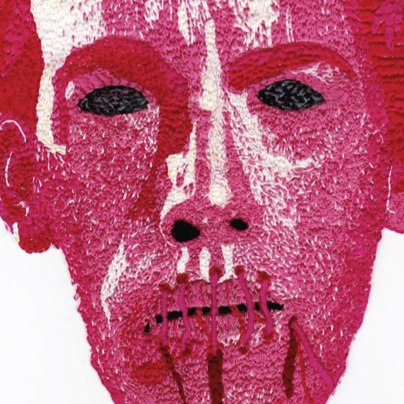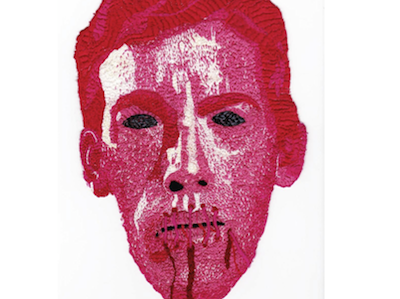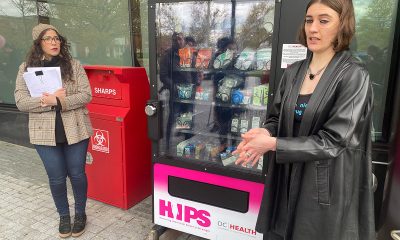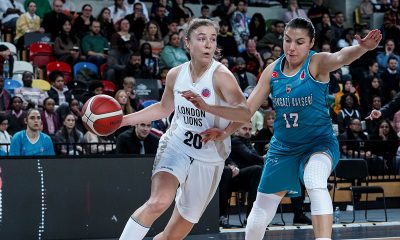Arts & Entertainment
‘Queer Objectivity’ exhibit continues at UMD
Curator Kris Grey to give lecture Tuesday on ‘Queering the Body’


‘Censorship Protest Mask (David Wojnarowicz)” by L.J. Roberts, embroidery on cotton, a 2011 work that is part of the ‘Queer Objectivity’ exhibit. (Image courtesy the gallery)
Sometimes in art exhibits, it’s hard to pin down the sexual orientation of the artists. This happens in other fields as well — folks argue the art should speak for itself — but that sure ain’t the case with “Queer Objectivity,” an exhibition curated by Kris Grey at the Stamp Gallery at the University of Maryland at College Park.
“Queer Objectivity” is a curated exhibition that brings together 16 emerging and established artists diverse in their identities, experiences, materials and approaches. Some of the artwork exhibited addresses the body in relation to objects. Others may present the body as an object itself. Still further, some work presents objects as conduit for the body to another realm. There will be a range of artwork displayed including photography, sculpture, performance and new media.
“Recent scholarship in material studies and phenomenology has challenged the traditional notion that human bodies are stable entities divorced from other objects in the material world,” Grey writes in an introductory statement. “The elevation of queer theory to academic prominence and the emergence of new types of feminism have further complicated the separation between personal and political — bodies and objects. Materially, the human body is comprised of separate, interacting, individual elements and forces that are often reduced to being seen as one. So too, the intricacies of bodies and their relationship to other objects, animated or not, get flattened into a binaristic body/other dichotomy.”
Artists featured in this ambitious exhibition include AK Burns, Heather Cassils, Nicolaus Chaffin, Mary Coble, Lauren Denitzio, Brendan Fernandes, Kris Grey, Gordon Hall, Katie Hubbard, JJ McCracken, Cupid Ojala, LJ Roberts, Coral Short, Caitlin Rose Sweet, Tobaron Waxman and Jade Yumang.
The exhibit runs through Dec. 6. On Tuesday evening (Nov. 19), Grey, a genderqueer artist, will give a lecture on the exhibit at 6:30 p.m. in the Herman Maril Gallery in the Art/Soc Building.
The Stamp Gallery is on the first floor of the Adele H. Stamp Student Union-Center for Campus Life at the University of Maryland at College park. The gallery is free and open to the public Mondays through Thursdays from 10 a.m.-8 p.m.; Fridays from 10 a.m.-6 p.m. and Sundays from 11 a.m.-5 p.m. For more information, visit thestamp.mud.edu/gallery.

Team DC, the umbrella organization for LGBTQ-friendly sports teams and leagues in the D.C. area, held its annual Night of Champions Awards Gala on Saturday, April 20 at the Hilton National Mall. The organization gave out scholarships to area LGBTQ student athletes as well as awards to the Different Drummers, Kelly Laczko of Duplex Diner, Stacy Smith of the Edmund Burke School, Bryan Frank of Triout, JC Adams of DCG Basketball and the DC Gay Flag Football League.
(Washington Blade photos by Michael Key)




















The 2024 National Cannabis Festival was held at the Fields at RFK Stadium on April 19-20.
(Washington Blade photos by Michael Key)
















Covering the @NatlCannaFest at RFK Stadium for @WashBlade . Stop by the LGBTQ+ booth and pick up a paper if you are here. pic.twitter.com/is7hnsaPns
— Michael Patrick Key (@MichaelKeyWB) April 20, 2024
Theater
‘Amm(i)gone’ explores family, queerness, and faith
A ‘fully autobiographical’ work from out artist Adil Mansoor

‘Amm(i)gone’
Thorough May 12
Woolly Mammoth Theatre
641 D St., N.W.
$60-$70
Woollymammoth.net
“Fully and utterly autobiographical.” That’s how Adil Mansoor describes “Amm(i)gone,” his one-man work currently playing at Woolly Mammoth Theatre.
Both created and performed by out artist Mansoor, it’s his story about inviting his Pakistani mother to translate Sophocles’s Greek tragedy “Antigone” into Urdu. Throughout the journey, there’s an exploration of family, queerness, and faith,as well as references to teachings from the Quran, and audio conversations with his Muslim mother.
Mansoor, 38, grew up in the suburbs of Chicago and is now based in Pittsburgh where he’s a busy theater maker. He’s also the founding member of Pittsburgh’s Hatch Arts Collective and the former artistic director of Dreams of Hope, an LGBTQ youth arts organization.
WASHINGTON BLADE: What spurred you to create “Amm(i)gone”?
ADIL MANSOOR: I was reading a translation of “Antigone” a few years back and found myself emotionally overwhelmed. A Theban princess buries her brother knowing it will cost her, her own life. It’s about a person for whom all aspirations are in the afterlife. And what does that do to the living when all of your hopes and dreams have to be reserved for the afterlife?
I found grant funding to pay my mom to do the translation. I wanted to engage in learning. I wanted to share theater but especially this ancient tragedy. My mother appreciated the characters were struggling between loving one another and their beliefs.
BLADE: Are you more director than actor?
MANSOOR: I’m primarily a director with an MFA in directing from Carnegie Mellon. I wrote, directed, and performed in this show, and had been working on it for four years. I’ve done different versions including Zoom. Woolly’s is a new production with the same team who’ve been involved since the beginning.
I love solo performance. I’ve produced and now teach solo performance and believe in its power. And I definitely lean toward “performance” and I haven’t “acted” since I was in college. I feel good on stage. I was a tour guide and do a lot of public speaking. I enjoy the attention.
BLADE: Describe your mom.
MANSOOR: My mom is a wonderfully devout Muslim, single mother, social worker who discovered my queerness on Google. And she prays for me.
She and I are similar, the way we look at things, the way we laugh. But different too. And those are among the questions I ask in this show. Our relationship is both beautiful and complicated.
BLADE: So, you weren’t exactly hiding your sexuality?
MANSOOR: In my mid-20s, I took time to talk with friends about our being queer with relation to our careers. My sexuality is essential to the work. As the artistic director at Dreams of Hope, part of the work was to model what it means to be public. If I’m in a room with queer and trans teenagers, part of what I’m doing is modeling queer adulthood. The way they see me in the world is part of what I’m putting out there. And I want that to be expansive and full.
So much of my work involves fundraising and being a face in schools. Being out is about making safe space for queer young folks.
BLADE: Have you encountered much Islamophobia?
MANSOOR: When 9/11 happened, I was a sophomore in high school, so yes. I faced a lot then and now. I’ve been egged on the street in the last four months. I see it in the classroom. It shows up in all sorts of ways.
BLADE: What prompted you to lead your creative life in Pittsburgh?
MANSOOR: I’ve been here for 14 years. I breathe with ease in Pittsburgh. The hills and the valleys and the rust of the city do something to me. It’s beautiful, it’ affordable, and there is support for local artists. There’s a lot of opportunity.
Still, the plan was to move to New York in September of 2020 but that was cancelled. Then the pandemic showed me that I could live in Pittsburgh and still have a nationally viable career.
BLADE: What are you trying to achieve with “Amm(i)gone”?
MANSOOR: What I’m sharing in the show is so very specific but I hear people from other backgrounds say I totally see my mom in that. My partner is Catholic and we share so much in relation to this.
I hope the work is embracing the fullness of queerness and how means so many things. And I hope the show makes audiences want to call their parents or squeeze their partners.




















